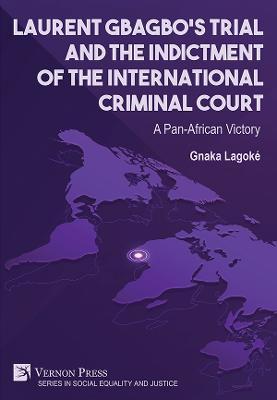Laurent Gbagbo's Trial and the Indictment of the International Criminal Court: A Pan-African Victory

Laurent Gbagbo's Trial and the Indictment of the International Criminal Court: A Pan-African Victory
The International Criminal Court (ICC), created in 2002 to combat impunity, projects a sense of unfairness and stirs an unending debate. A trial before the court epitomizes the controversy surrounding it, perceived as a neocolonialist tool in the hands of the most powerful nations. This research critically examines the trial of the former president of Ivory Coast, Laurent Gbagbo. The two-decade crisis in Ivory Coast was a series of armed, diplomatic, and political conflicts in which human rights were violated by all sides. Military confrontation resumed as a result of an electoral stalemate that followed a controversial presidential election in the fall of 2010. The most atrocious human rights abuse was perpetrated at the end of March 2011 by the rebel forces backed by the French and the United Nations troops: the massacre of Duékoué. In one day, hundreds of Laurent Gbagbo's followers were killed. However, the ICC undertook a selective prosecution against Gbagbo's camp.
After a trial of eight years, Laurent Gbagbo was finally acquitted. The news of his unanticipated acquittal shocked the world. Later, that decision was overturned and transformed into freedom with binding and coercive conditions by the Appeals Chamber, which had succumbed to political pressure. The former president of Ivory Coast spent months of confinement in Belgium until the Appeals Chamber rebutted the prosecutor's appeal against his release and confirmed his total acquittal and that of Blé Goudé. He eventually went back to Ivory Coast on June 17, 2021.
The trial of Laurent Gbagbo before the ICC, despite his acquittal (a tardy one), reflects a series of biases germane to international law and international justice, such as the victor's justice stance, the conflict between national law and international law, the question of sovereignty, and the issue of lawfare. The trial of Laurent Gbagbo, which was the hallmark of the selective international justice system embedded in unfairness, led to a historical landmark with his shocking acquittal, which led to the indictment of the International Court, whose fate has thus been sealed before history.
PRP: 514.08 Lei
Acesta este Prețul Recomandat de Producător. Prețul de vânzare al produsului este afișat mai jos.
462.67Lei
462.67Lei
514.08 LeiLivrare in 2-4 saptamani
Descrierea produsului
The International Criminal Court (ICC), created in 2002 to combat impunity, projects a sense of unfairness and stirs an unending debate. A trial before the court epitomizes the controversy surrounding it, perceived as a neocolonialist tool in the hands of the most powerful nations. This research critically examines the trial of the former president of Ivory Coast, Laurent Gbagbo. The two-decade crisis in Ivory Coast was a series of armed, diplomatic, and political conflicts in which human rights were violated by all sides. Military confrontation resumed as a result of an electoral stalemate that followed a controversial presidential election in the fall of 2010. The most atrocious human rights abuse was perpetrated at the end of March 2011 by the rebel forces backed by the French and the United Nations troops: the massacre of Duékoué. In one day, hundreds of Laurent Gbagbo's followers were killed. However, the ICC undertook a selective prosecution against Gbagbo's camp.
After a trial of eight years, Laurent Gbagbo was finally acquitted. The news of his unanticipated acquittal shocked the world. Later, that decision was overturned and transformed into freedom with binding and coercive conditions by the Appeals Chamber, which had succumbed to political pressure. The former president of Ivory Coast spent months of confinement in Belgium until the Appeals Chamber rebutted the prosecutor's appeal against his release and confirmed his total acquittal and that of Blé Goudé. He eventually went back to Ivory Coast on June 17, 2021.
The trial of Laurent Gbagbo before the ICC, despite his acquittal (a tardy one), reflects a series of biases germane to international law and international justice, such as the victor's justice stance, the conflict between national law and international law, the question of sovereignty, and the issue of lawfare. The trial of Laurent Gbagbo, which was the hallmark of the selective international justice system embedded in unfairness, led to a historical landmark with his shocking acquittal, which led to the indictment of the International Court, whose fate has thus been sealed before history.
Detaliile produsului










